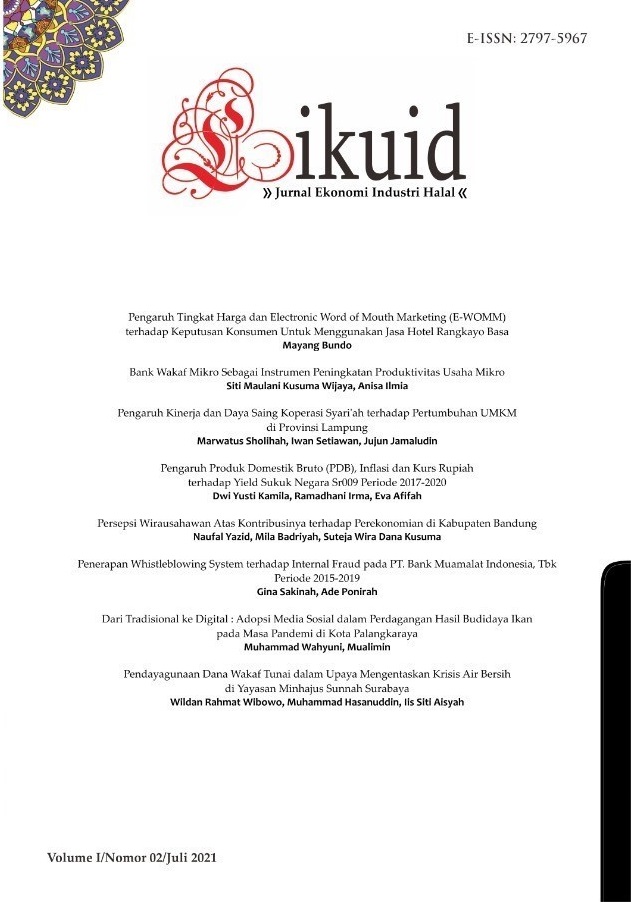PENDAYAGUNAAN DANA WAKAF TUNAI DALAM UPAYA MENGENTASKAN KRISIS AIR BERSIH DI YAYASAN MINHAJUS SUNNAH SURABAYA
DOI:
https://doi.org/10.15575/likuid.v1i2.14162Abstract
Water is the most important thing for all aspects of life. Today, many water problems arise as a result of the decreasing amount of clean water. This is the obligation of the Central and Regional Governments to provide clean water services to the community. However, considering the wide coverage area of Indonesia and the limited government funds, it requires the support of the private sector to overcome these problems. One of them is Islamic philanthropy, especially waqf management. This study aims to determine the mechanism for utilizing cash waqf funds and the factors supporting and inhibiting the utilization of waqf funds in the clean water supply program at the Minhajus Sunnah Foundation Surabaya. This research uses a descriptive qualitative method, namely by describing the actual information that occurs in the field (field research). Data was collected by doing interview, observation, and documentation. The result of this research is the mechanism for utilizing waqf funds at the Minhajus Sunnah Surabaya Foundation, the cash waqf funds themselves obtained from their permanent donors (wakif), namely the Dar Al Ber Society Foundation which is based in Dubai, United Arab Emirates. The fund that is given according to the wishes of the Dar Al Ber Society Foundation with the terms and specifications of the project that had been determined by them. This form of utilization of waqf funds is a form of distribution by providing services directly to the community in the form of building wells.
Keywords: waqf, cash waqf, utilization of waqf, water crisis
References
Agha, E. (2018). How Islamic Finance Can Help The Government of Pakistan To Solve Its Water and Electricity Crisis: A Proposed Model of Waqf-Sukuk.
Alhifhi & Muslich & Trihantana. (2017). WAQF : instrumen pemberdayaan masyarakat di Pondok Pesantren Daarut Tauhiid. Jurnal Ekonomi Islam Indonesia, Perbankan dan Keuangan, 03.
Badan Pusat Statistik (BPS). (2019). Persentase Rumah Tangga Yang Memiliki Akses Terhadap Layanan Sumber Air Minum Layak Dan Berkelanjutan (40% Bawah), Menurut Daerah Tempat Tinggal (Persen), 2017-2019. https://www.bps.go.id/indicator/23/1556/1/persen-tase-rumah-tangga-yang-memiliki-akses-terhadap-layanan-sumber-air-minum-layak-dan-berkelanjutan-40-bawah-menurut-daerah-tempat-tinggal.html, diakses pada tanggal 29 Desember 2020
Wildan Rahmat, Muhammad Hasanuddin, Iis Siti Aisyah,Pendayagunaan Dana Wakaf Tunai dalam Upaya …………..
Jurnal Likuid, Volume I Nomor 02 Juli 2021 116
Budiman, M. A. (2014). The Significance of Waqf for Economic Development. 14.
Departemen Agama RI. (2010). Al-Qur’an dan Terjemahannya. Bandung: CV DIPONEGORO.
Direktorat Jenderal Bimbingan Masyarakat Islam. (2008). Pedoman Pengelolaan Wakaf Tunai. Jakarta, Kementerian Agama RI., hlm 1.
Hakim, D. L. (2010). Aksesibilitas Air Bersih Bagi Masyarakat di Permukiman Linduk Kecamatan Pontang Kabupaten Serang. Tesis-Universitas Diponegoro.
Kemen PPN/BAPPENAS. (2019). Rancangan Teknokratik: Rencana Pembangunan Jangka Menengah Nasional 2020-2024. hlm 17.
Kodoatie, R. J., & Sjarief, R. (2010). Tata Ruang Air. Penerbit Andi.
Latief, H. (2016). Filantropi dan Pendidikan Islam di Indonesia. Jurnal Pendidikan Islam, 28(1), 123. https://doi.org/10.15575/jpi.v28i1.540
Lubis, H. (2020). Potensi dan Strategi Pengembangan Wakaf Uang di Indonesia. ISLAMIC BUSINESS and FINANCE, 1(1), Article 1. http://ejournal.uin-suska.ac.id/index.php /IBF/article/view/9373
Mohsin, M. I. A. (2013). Financing through Cash-Waqf: A Revitalization to Finance Different Needs International (Vol. 6). Journal of Islamic and Middle Eastern Finance and Management.
Moleong, L. J. (1994). Metodelogi Penelitian Kualitatif, Edisi Revisi. Remaja Rosdakarya.
Rahmawati, T., & Fauzi, M. M. (2020). FIKIH FILANTROPI : Studi Komparatif Atas Tafsir Fi Sabilillah Muhammadiyah Dan Nahdlatul. Duta Media Publishing.
Ryandono, M. (2018). Wakaf dan Sukuk sebagai Sumber Pembiayaan Ekonomi dalam Infrastruktur Pembangunan di Indonesia.
Santoso, H. (2006). "Kebijakan Infrastruktur Air Bersih dan Kemiskinan.†Jurnal Percik, Edisi April,.
www.kompas.com. (2020). Potensi Wakaf di Indonesia Capai Rp 180 Triliun Per Tahun.KOMPAS.com. https://money.kompas.com/read/2020/10/30/193149326/potensi-wakaf-di-indonesia-capai-rp-180-triliun-per-tahun, diakses pada 31 Desember 2020











